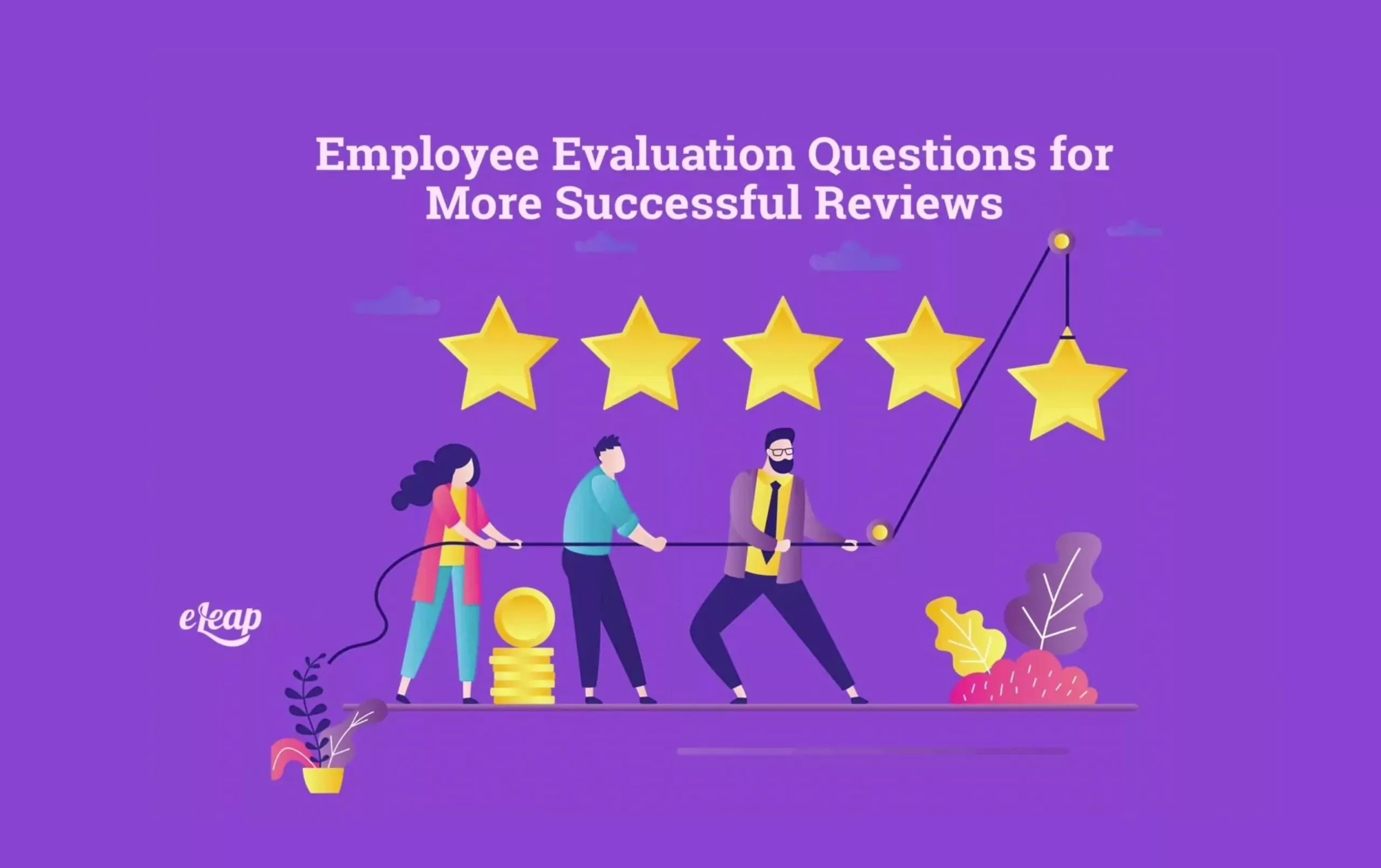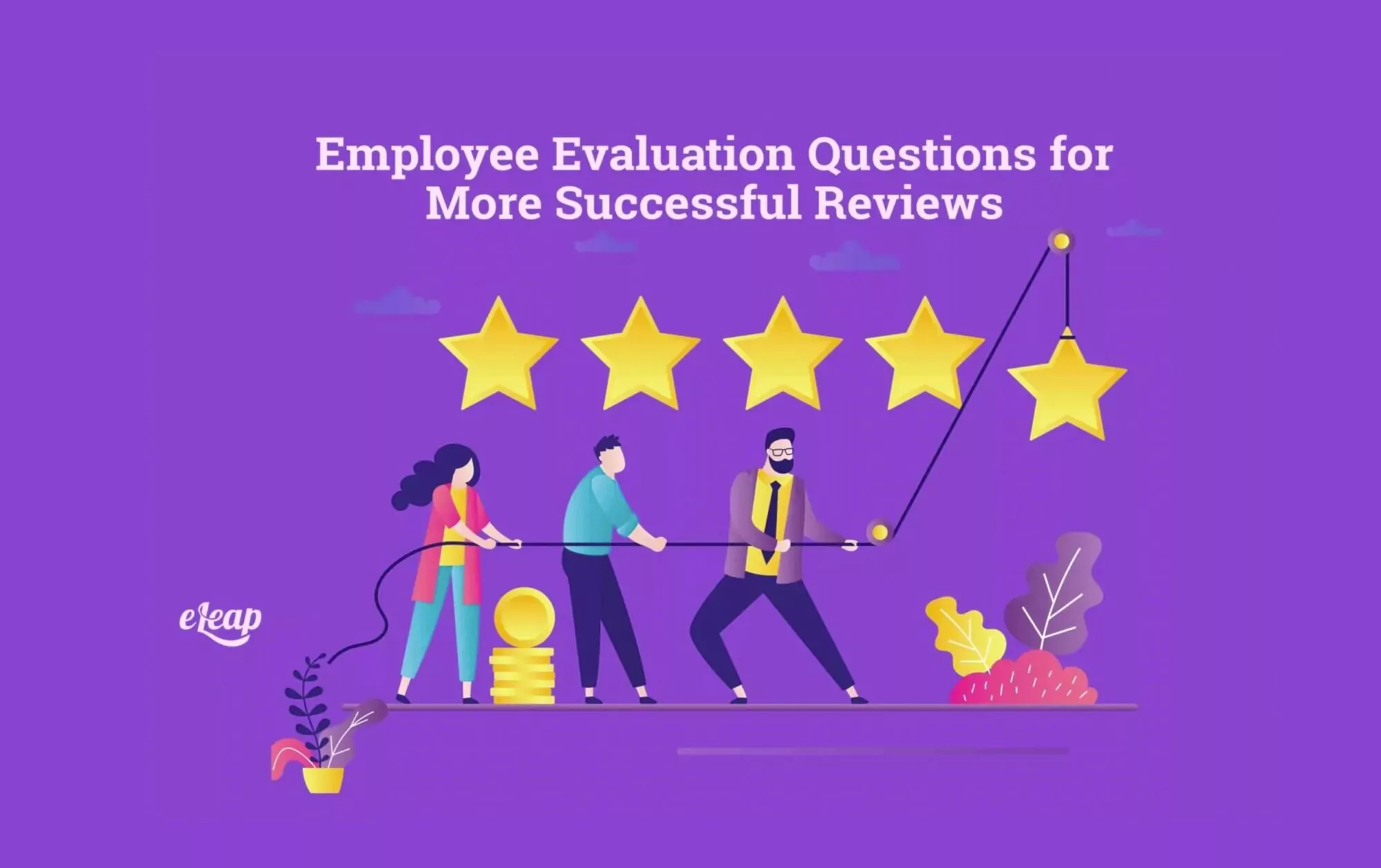Employee Evaluation Questions for More Successful Reviews

Are you tired of using the same employee evaluation questions that only leave you with generic or forced answers? Perhaps you’re looking for a better way to engage your team through the review process. You might be surprised to learn that of all the changes you can make to the process, asking the right questions can make all the difference. The eLeaP People Success Platform, which includes a continuous performance management system, provides organizations with powerful options to attract and retain high-caliber team members.
Performance reviews have been a trending topic for some time now. The conversation has shifted, however, from whether there is a need for a better process to the discussion of which process(es) should be adopted to improve performance while also improving the feedback process.

Before we discuss the best questions to help with your performance reviews, let’s talk a little more about what good reviews and feedback questions can do, and how you should be utilizing them.
Use Employee Evaluation Questions to Find People’s Strengths
Historically, performance reviews were dreaded, or avoided at all costs, because they were synonymous with “improvement”—that is, many of the conversations were about employee weaknesses and how they could improve. That has never been effective, nor will it be useful in your reviews today.
Instead, you should be considering how you can utilize reviews and questions to highlight the strengths of your employees. Your talent is your biggest advantage. It’s important to make sure that your people know how talented they are so they can leverage those skills moving forward.
Align Employee Goals with Organizational Goals
Goals are a part of the employee development process, and they should be aligned with the organization’s own mission and goals. When employees work for organizations that align with their own values, they have more motivation than those who don’t. People want to make a positive impact on (and for) the company.
When you have employees and managers whose own goals are in line with the company, everyone will cross the finish line at the same time. This is the epitome of teamwork, and it’s easy to foster when you have aligned goals.
Help People Determine Their Future Path
According to research, 94% of workers say that they would stay with a company that invested in their growth and development. While creating a unique career path for every single employee can seem like a daunting task, it’s actually a lot easier to do when you properly utilize performance reviews.
When you take the time to talk to people about their own career development goals and even their personal goals, you’ll gain valuable insight into your best talent. You’ll also see an increase in engagement, motivation, and performance across the board. Even if someone’s future is just to continue to grow and develop in their current role, that’s a conversation you need to have.
The Benefits of Effective Evaluations
Now that you understand the areas of focus to include in your evaluations take a minute to learn about some of the benefits that come from doing effective evaluations. Using the right questions helps create the conversation that you need to have to be able to deliver successful feedback. In addition to that, improving the employee evaluation process also offers benefits like:
Motivation. When employees are included in their career evaluations, they will feel like they are a bigger part of the process and the company. This will lead to increased motivation in several different ways, including personal and professional development.
Accountability. Effective employee evaluation questions will help leaders create a sense of accountability with their teams. People like to have ownership of their roles and responsibilities, as well as their goals. Utilizing effective performance reviews will encourage everyone to take ownership and be accountable for their development.
Transparency in Communication. Effective evaluations encourage an ongoing conversation about performance. Today’s organizations need to adopt a 360-degree, ongoing feedback process that helps everyone become their best. When you implement this successfully, everyone will be able to communicate more clearly and effectively.
Better Teamwork. Evaluations also allow leaders to stop and consider the teams that are currently in place throughout the organization. They can determine how well the teams are working together, whether there are changes that need to be made, and more. Ultimately, an effective individual evaluation will lead to a team of people who want to do their best work.
Easily Identified Advancement Potential. When you ask the right questions and get the right answers, it puts your organization in a better position to recognize candidates who are ready for a promotion. Knowing which questions to ask will also help you encourage people to seek growth even if they haven’t before. Then, you can promote from within, improve culture, and recognize people for their achievements.
Easy Identification of Problem Areas. In the same regard, effective evaluations can also help to pinpoint trouble spots or areas where employees may be struggling a bit. It will even give the employee themselves the chance to analyze their strengths and weaknesses. They can use that insight to create goals for improvement.
Increased Engagement. When you have people who are involved in their career development, they will be more engaged and present within the company in general. Engaged employees are more loyal, and they will stick around longer than those who aren’t. Plus, your company culture will soar as people begin to feel more like they’re a valued part of the organization.
These are just a few of the biggest benefits to be had from effective employee evaluation questions and performance reviews. You can even work with your team to figure out which questions you should be asking to help you get the information you need. When you do it well, you can cultivate a much more successful team.
Sample Employee Evaluation Questions to Assist Your Review Process
Based on the categories above (strengths, goals, future development), there are several different questions that you can ask people to get a gauge of where they stand and where they want to be. It’s about asking the right questions at the right time and to the right people. It also means involving people in their development and giving them ownership of their own evaluation process.
To that end, here are some common sample questions that you could use to gauge where employees stand and how they feel about their current position and experience.
- What do you feel are a few of your biggest strengths? How are they demonstrated?
- What are the most and least motivating parts of your job?
- What achievements have you made since your last review? Which is your biggest accomplishment?
- What strengths would you like to develop in the coming months/years?
- What personal and professional goals do you have?
- What roles or areas of interest are you most interested in within our organization?
- What do you hope to accomplish at our company within the next year?
- What kind of development opportunities would help you with your career?
- Do you have long-term goals that require professional development assistance?
- What is your dream career journey like? What position and responsibilities would you most enjoy?
As you can see, many of these questions are leading questions. They’re encouraging your people to think about their roles, responsibilities, and other aspects of their career. They also encourage you to discuss future development and help people start thinking about creating their own career goals.
While you’re reviewing performance, you’re also giving people the reins and reassurance that they can take ownership of that performance. Here are a few tips to make the entire process easier.
Tips for Success with Employee Evaluations and Development
This might sound like a lot, but it’s really simpler than most people think. It starts by creating a process for evaluations that hits all the marks and allows you to deliver on your goals as well as to help employees reach theirs. The best way to have successful evaluations is to be transparent and direct, to highlight achievements and recognize people’s value, and give employees the individual support they deserve.
Effective employee evaluation questions will:
- Be specific and measurable
- Use action words
- Be constructive and positive
- Focus on solutions and opportunities
- Respect and value good performance
- Focus on individual performance
- Avoid bias
- Avoid generalizations that are difficult to measure
For many organizations, employee evaluations have been an impossible task for decades. There never seems to be a “good” way to deliver these reviews, and sometimes people just stick to the standard review process because it’s easier than trying to come up with something better. Fortunately, you’re now equipped to know better and do better.
The Bottom Line
Successful evaluations mean successful employee development. That can enhance your organization in several ways, including by adding revenue and profits. And for those companies that are struggling with how to handle these evaluations, the tips in this guide should help.
Remember to be objective in evaluations and encourage people to get more involved. This shouldn’t be a sit-down where you’re simply reading off a piece of paper and talking at the employees—it’s a discussion you need to have with the employees.